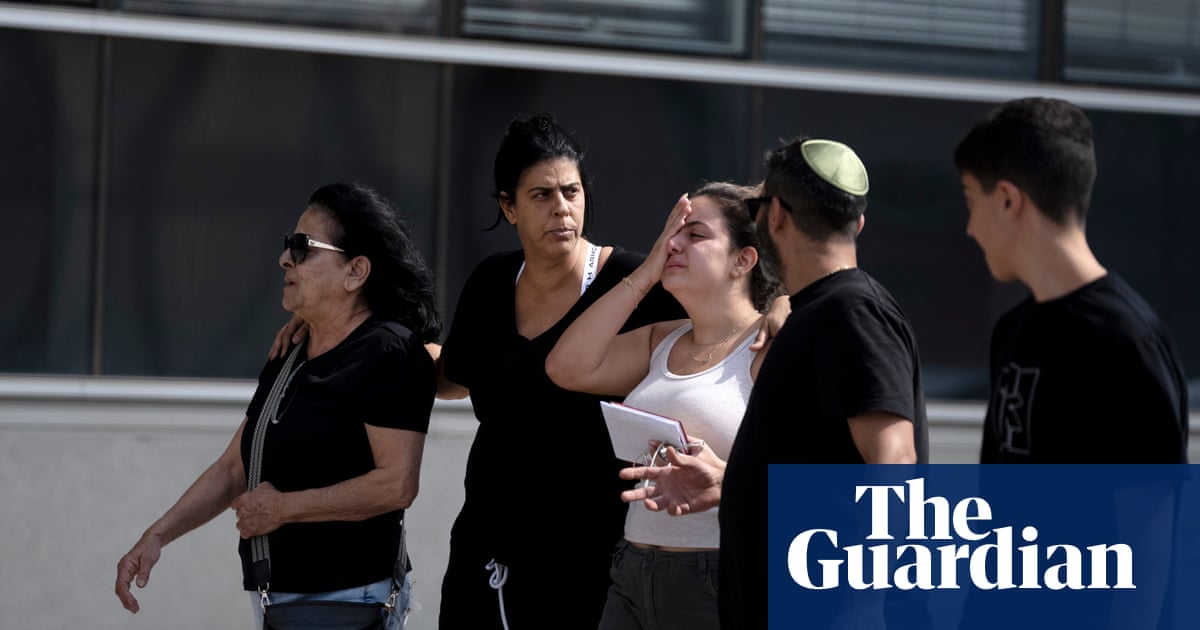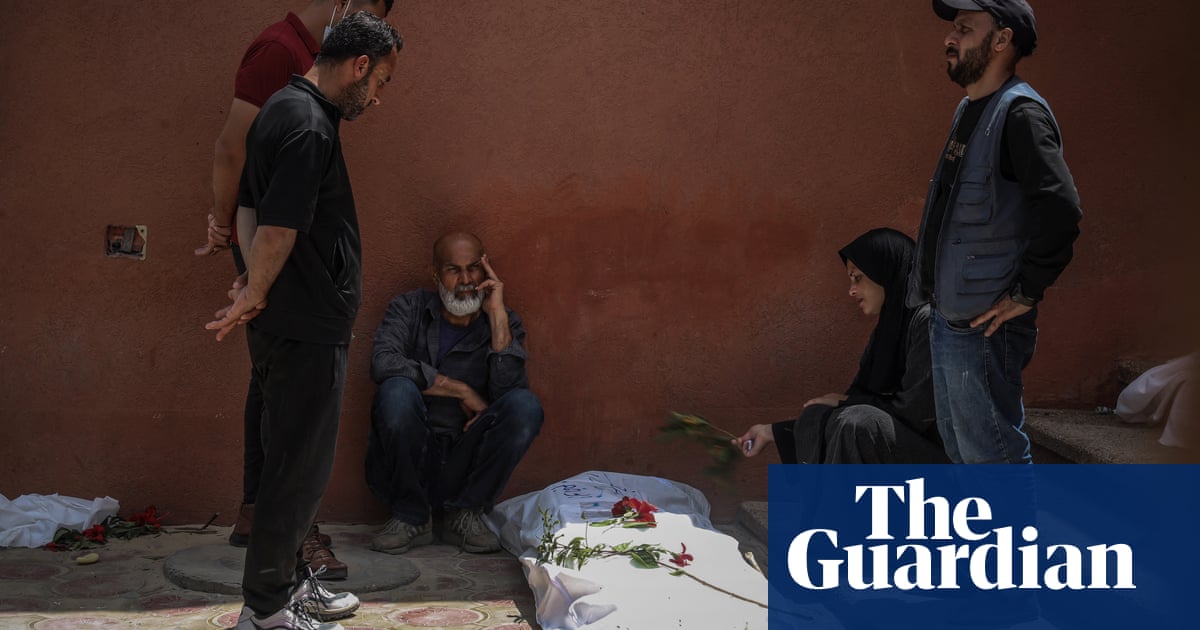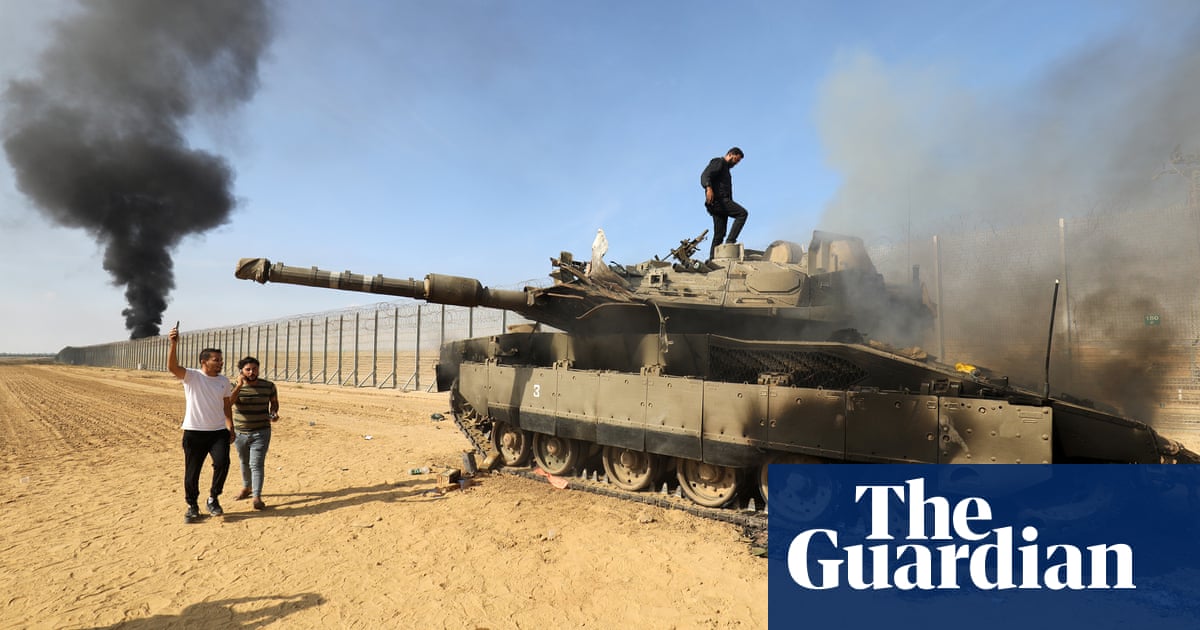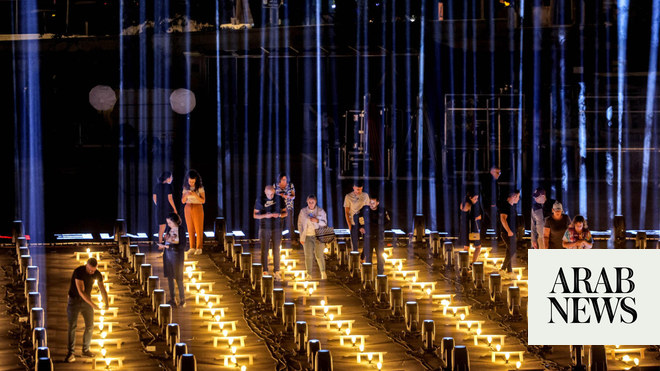
Steve Markachenko, a 25-year-old from Carmel, in northern Israel, had been looking forward to attending the Nova music festival on a desert kibbutz this weekend. He and his girlfriend, Elisa Levin, 34, drove four hours south on Friday night for the event celebrating the Jewish harvest festival of Sukkot.
But at 6.30am on Saturday, they were among thousands of young partygoers enjoying the sunrise but unaware that their lives were about to change for ever. At first, the air raid sirens seemed as if they were part of the trance music, survivors said. Then rocket vapour trails began appearing in the sky above: people started panicking about being caught in the open and rushed to their cars. And then the gunfire began.
At least 260 bodies were discovered at the site of the all-night festival, Israeli officials said late on Sunday, and the figure was likely to rise. Dozens more were still missing, thought to have been taken to the Gaza strip as hostages. The attack was one of the worst single incidents during the Palestinian militant group Hamas’ surprise offensive Operation al-Aqsa Flood – a day that will go down in history as Israel’s 9/11.
Some attenders watched their friends die in front of them; others played dead for hours until they heard voices speaking in Hebrew and knew help had arrived. Videos from the scene show lifeless bodies on the ground, a shot-up van, and men and women being dragged away by armed militants. Screams fill the air.
One harrowing clip showed an Israeli woman identified as Noa Argamani pleading for her life as she was separated from her partner and driven away on a motorbike by two Hamas fighters.
Markachenko and Levin managed to escape the initial chaos, his brother Dima said. Their car’s GPS system shows the vehicle still located about 5km (3 miles) away from the party site. But no one has heard from the couple since about 6.15am, when Levin called her brother.
“We don’t know anything. The Home Front, the police, the army, no one has any information to give us. We’ve been to every hospital in the country, nothing. And the road is blocked, so we can’t go to their car,” the 32-year-old said.
“All this technology, all this stuff we have done to keep ourselves safe, the army, it meant nothing. This country is a joke.”
Markachenko was at a missing persons centre set up at a police station near Tel Aviv’s airport on Sunday to register his brother’s name and submit DNA samples. He was one of hundreds of quiet, subdued people who went in and out of the centre over the course of the morning. In what is usually a deeply divided society, Israelis of all backgrounds – secular, ultra-Orthodox, nationalist-religious types, Ashkenazi, Mizrahi, and Palestinian citizens of Israel – milled around the building, united in worry and grief.
Some people were sure of their loved ones’ whereabouts after seeing their terrified faces in Hamas videos that appear to have been filmed inside Gaza. Approximately 100 Israelis, both military and civilians, are now believed to have been taken into the enclave, although there is still no official total.
In the past, Hamas has used captive Israelis as bargaining chips to secure the release of its members in Israel’s prisons, but has never managed to seize more than a couple at a time until now. Gilad Shalit, a soldier held in Gaza for five years, was released in 2011 in exchange for more than 1,000 Palestinian prisoners.
“My cousin, his wife, and their eight-year-old daughter, they are in Gaza. They have a 15-year-old boy too, but we don’t know where he is,” said Nitzan Eli Akin, 51. His family members – Noam, 48, Dikla, 51 and Ella – were seized at gunpoint from the border kibbutz Nahal Oz. Their last contact was about 10:30am on Saturday, when they sent messages saying that terrorists were inside their community.
“They look like they are not underground in a tunnel, that’s good, and there is some blood on their clothes but they seem in OK health. We are just begging for anyone to help us return them safely,” he said.
Israelis are used to war, but the scale and ferocity of Saturday’s attack blindsided the country’s security and intelligence forces, who assessed as recently as last week that Hamas was not currently interested in a full-scale conflict. Now they are facing the fifth war in the 16 years since the Islamists seized control of the strip and Israel and Egypt imposed a punishing air, land and sea blockade.
Barrages of rocket fire were used as cover for the devastating and unprecedented ground attack, which saw Hamas operatives break through 29 points in the hi-tech Israeli defences surrounding the tiny enclave before fanning out in trucks and motorbikes into 22 nearby Israeli communities.
The militants shot indiscriminately at people in the streets, before entering homes and public buildings, where in some cases they seized hostages. The Israel Defence Forces (IDF) were slow to respond; fighting continued overnight and into Saturday evening as the army still struggled to neutralise gunmen in different locations. By sundown, at least three villages and kibbutzim appeared to be going back and forth between Israeli and Hamas control.
At least 700 Israelis have been killed, with the death toll likely to keep rising. Hamas’s attack is now the deadliest in the country’s history: that is already the same number of civilian dead as the entirety of the five-year-long intifada, or Palestinian uprising, of the 2000s, in just a single day.
As the war lurched into a second day on Sunday, sirens continued to blare across southern and central Israel as volleys of rockets launched from Gaza hit the same areas that suffered Saturday’s violence; the IDF is evacuating Israelis from a buffer zone around the strip, making a ground offensive more likely. Near the city of Ashkelon, highways heading north were packed, but empty in the other direction, other than army vehicles and a handful of civilian cars blasting music to raise troops’ morale.
Around noon, two F-16 fighter jets roared over the traffic, heading towards the Mediterranean, before turning south towards the Gaza Strip. Retaliatory Israeli airstrikes on the besieged Palestinian territory have killed at least 370 people, the Hamas health ministry said. Initial Palestinian media reports also suggested that 17 members of one family, aged between one and 65, had been killed in a single strike.
Israel’s northern front, against the Lebanese militant group Hezbollah, was also tense after the Iran-backed Islamists claimed a rocket attack on Israeli territory. The Shia group normally sits out flare-ups in Gaza, but has warned that it will respond if Israel sends ground forces into the strip. A war on three fronts, if the restive West Bank also ignites – or even four, if there is a return to the intercommunal violence seen in 2021 – would mark an unprecedented escalation in the decades old Palestinian-Israeli conflict.
The trail of destruction left by Hamas across communities in southern Israel was easy to follow. On Ha-Tamar Street, in the small town of Ofakim, nearly every house was covered in bullet holes, every car shot up, and traditional Sukkot tents for eating outside during the holiday ripped and torn. Inside one street bomb shelter, drying streaks of blood marked the wall.
A couple there were taken hostage by at least one militant, and were released alive after a special forces raid killed the captors. Neighbour George Elkhazov, 23, along with his parents and sister, first realised something deeply frightening was happening when a Hamas gunman carrying a rocket-propelled grenade and four others rang the doorbell. After seeing him through the intercom camera, the family huddled behind the kitchen wall for 17 hours until the shooting was over.
“I got a call, two hours in, telling me I had been called up for reserve service,” Elkhazov said. “I was the one asking, ‘Where are you? Why aren’t you helping us?’”
Amid the tragedy, there were stories of hope and bravery. Yair Golan, a reserve major general and a former member of the Knesset for the leftwing Meretz party, reportedly saved a passerby from armed gunmen, while a retired general living in Tel Aviv travelled to his son’s kibbutz, successfully freeing his family.
But the overwhelming sentiment in Israel right now is shock – coupled with a rising sense of anger.
“This can never happen again,” said Dima Markachenko, whose brother, Steve, has not been seen since the attack on the music festival. “We need to crush Gaza. Once and for all this time.”












